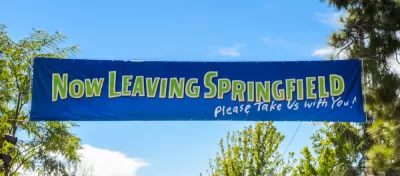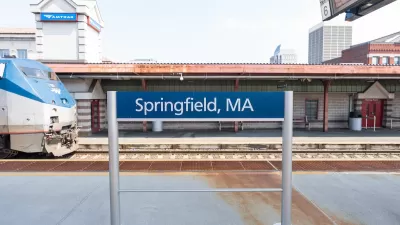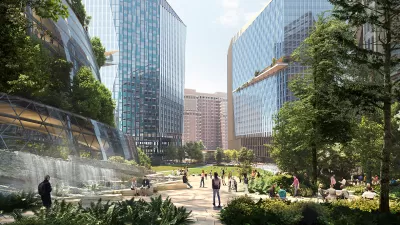The pundits got it wrong.

Since Amazon announced its request for proposals for a new second location, handicapping the behemoth corporation's final choice has been almost a cottage industry for many urbanists.
The victor in this contest was promised economic development spoils like a $5 billion construction project, a highly-taxable employment base of 50,000, and a chance for politicians to fast-lane legacy infrastructure projects without it looking too much like a corporate giveaway.
When Amazon CEO Jeff Bezos took to the podium at a press conference held in Seattle to make the long-awaited announcement, the stakes were high. The choice would be made from one of three finalists: Quahog, Springfield, and South Park. When it came time to make the announcement, Bezos got straight to the point, before going on a bit of a tangent. Here's his full statement.
We will be opening Amazon's second headquarters in Springfield. We chose this location for to its metaphorical powers, with its long history of representing all that is troubled and redeeming about middle America, its access to a reliable energy source, and a talented workforce that seems to never get caught napping. I would also like to personally thank Mr. Montgomery Burns for the special attention and the scalp maintenance tips.
It's not at all weird that you've been so interested in which city we might pick for the second headquarters of a company with relatively short history in an industry with massive turnover, but here were are nevertheless. I appreciate how many cities have given me the the password to the Citibank app with connection to their General Fund to help me make my choice. Everyone being so no nice to me for so many months really made this process worth it. It was very difficult to cut down the list of finalists to three, but this final choice was even harder, because I don't want my friends in Quahog and South Park to stop texting the deets for our Bachelor viewing parties on Mondays.
To the residents of Quahog and South Park, I solemnly say, this isn't about you; this is about me. I hope we'll still be friends.
FULL STORY: April Fool's Day

Alabama: Trump Terminates Settlements for Black Communities Harmed By Raw Sewage
Trump deemed the landmark civil rights agreement “illegal DEI and environmental justice policy.”

Study: Maui’s Plan to Convert Vacation Rentals to Long-Term Housing Could Cause Nearly $1 Billion Economic Loss
The plan would reduce visitor accommodation by 25% resulting in 1,900 jobs lost.

Why Should We Subsidize Public Transportation?
Many public transit agencies face financial stress due to rising costs, declining fare revenue, and declining subsidies. Transit advocates must provide a strong business case for increasing public transit funding.

Paris Bike Boom Leads to Steep Drop in Air Pollution
The French city’s air quality has improved dramatically in the past 20 years, coinciding with a growth in cycling.

Why Housing Costs More to Build in California Than in Texas
Hard costs like labor and materials combined with ‘soft’ costs such as permitting make building in the San Francisco Bay Area almost three times as costly as in Texas cities.

San Diego County Sees a Rise in Urban Coyotes
San Diego County experiences a rise in urban coyotes, as sightings become prevalent throughout its urban neighbourhoods and surrounding areas.
Urban Design for Planners 1: Software Tools
This six-course series explores essential urban design concepts using open source software and equips planners with the tools they need to participate fully in the urban design process.
Planning for Universal Design
Learn the tools for implementing Universal Design in planning regulations.
Smith Gee Studio
Alamo Area Metropolitan Planning Organization
City of Santa Clarita
Institute for Housing and Urban Development Studies (IHS)
City of Grandview
Harvard GSD Executive Education
Toledo-Lucas County Plan Commissions
Salt Lake City
NYU Wagner Graduate School of Public Service





























